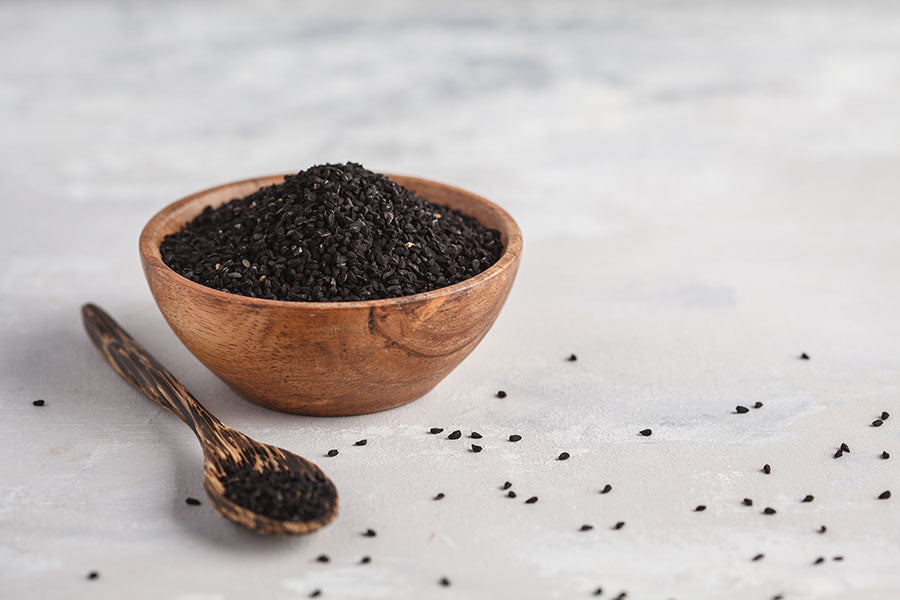
Black seed is a cold pressed vegetable oil derived from the seeds of the bushy, flowering plant Nigella sativa. The plant is known by a wide range of pseudonyms including fennel flower, nutmeg flower, Roman coriander, onion seed, and in the USA, it is known as charnushka, which is derived from Russian.
And just to really keep you on your toes, both the seeds of the plant and the derived oil are sometimes referred to as black cumin or black caraway! This illustrates the problems you can encounter when using the common names of plants or oils instead of the correct botanical or scientific name.
Black seed is an annual plant with stiff, thin branching stems, lacy grey-green leaves and attractive terminal whitish or blue flowers. The flowers are followed by a fruit capsule, which when mature opens to reveal small, triangular seeds that turn black upon exposure to the air.
These seeds have very little odour, but when ground or chewed they produce a spicy aromatic, oregano-like fragrance or flavour, hence its popular use as a spice throughout history. The plant may have either an upright or sprawling habit that can reach a height of 30-60 centimetres (12-24 inches).
Originally native to Syria, Nigella sativa is cultivated today in many Mediterranean countries as well as in North Africa, Asia Minor, India and the Near East for its tasty seeds which are commonly used in cooking. The beautiful, rich golden coloured oil is extracted by cold pressing the seeds.
Emphasis In Different Religions
This herb has an astonishing history, having been used for over 3,000 years for both culinary and medicinal purposes. The holy prophet Muhammed famously stated in his Hadith (teachings) 'Hold on to the use of the black seed for it has a remedy for every illness except death.' So its very important that we try to incorporate black seed in the diet.
Nigella seeds were found in the tomb of Tutankhamun, and black seed oil (amongst other botanicals) was reported to have been used by Cleopatra to retain her beauty.
Dioscorides, a Greek physician of the 1st century, recorded that black seeds were taken to treat intestinal worms, digestive disorders, headaches, nasal congestion and toothache. Avicenna (Ibn Sina), who wrote the great medical treatise 'The Canon of Medicine' referred to it as 'the seed that stimulates the body's energy and helps recovery from fatigue'.
In Middle Eastern countries black seed was so revered it was given the Arabic approbation 'habbat ul barakah', which means 'the seed of blessing' or 'the blessed seed', due to its amazing wealth of health-giving benefits.
Fragrance and Therapeutic Uses
In aromatherapy, black seed oil proves to be an extremely versatile oil that can be used in a multitude of ways to improve the condition of the skin and hair, as well as being put to use as a carrier oil in the traditional way for massaging. It is a rich oil, yet has a light, silky texture which feels wonderfully luxurious on the skin and is quickly absorbed when used on the face. Despite its deep moisturising qualities, it does not leave the skin feeling greasy at all.
As you may already know, the vegetable oils used in aromatherapy do not usually have much of a perceptible odour, but along with unrefined avocado and wheatgerm, black seed is an exception. It has a slightly medicinal and spicy fragrance that is noticeable, but certainly not unpleasant, - and its wealth of benefits more than makes up for this. Of course, once any essential oils are added to black seed its unique fragrance is instantly masked.
Black seed oil is particularly rich in unsaturated and essential fatty acids which makes it perfect as a skin food; it nourishes, soothes and softens dry skin and improves eczema, psoriasis, dermatitis and acne type conditions. This oil makes the perfect overnight facial treatment, and when used regularly it greatly improves the general condition of the skin, enhancing its texture and softness. Some research suggests it may have a wrinkle-softening effect, now wouldn't that be a nice bonus!
Hair, Pains and Aches
Because of its unique and wide-ranging properties, black seed oil helps to stop hair fall and best carrier for treating muscular aches and pains, arthritis, rheumatism, strains and sprains - even without any essential oils. Naturally, adding essential oils will greatly improve the efficacy of this method of treatment; black pepper, chamomile Roman and German, clove bud, eucalyptus, ginger, lavender, juniper berry and marjoram sweet are all highly effective essential oils you can utilize.
For a full body massage you may find black seed slightly too rich, so mix it with a lighter oil such as almond or peach kernel, much the same way as is done with other heavier oils such as rosehip, calendula or St John’s Wort.
As more practitioners of aromatherapy become aware of its many benefits, I feel sure it is destined to become more popular. Along with aloe vera, Nigella sativa is a giant amongst healing herbs, and its use throughout history plus the vast amount of research conducted into it surely supports its reputation.
Keep your eye on this oil; I believe it is destined to become much more popular in the future for both aromatherapy and general skin care.
If you would like 100% organic, cold pressed Black Seed in the USA then check this out!